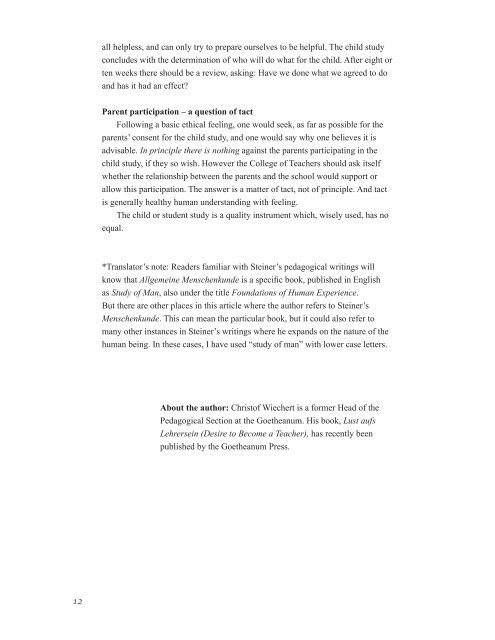Observing the Class Observing the Children - Research Institute for ...
Observing the Class Observing the Children - Research Institute for ...
Observing the Class Observing the Children - Research Institute for ...
You also want an ePaper? Increase the reach of your titles
YUMPU automatically turns print PDFs into web optimized ePapers that Google loves.
12<br />
all helpless, and can only try to prepare ourselves to be helpful. The child study<br />
concludes with <strong>the</strong> determination of who will do what <strong>for</strong> <strong>the</strong> child. After eight or<br />
ten weeks <strong>the</strong>re should be a review, asking: Have we done what we agreed to do<br />
and has it had an effect?<br />
Parent participation – a question of tact<br />
Following a basic ethical feeling, one would seek, as far as possible <strong>for</strong> <strong>the</strong><br />
parents’ consent <strong>for</strong> <strong>the</strong> child study, and one would say why one believes it is<br />
advisable. In principle <strong>the</strong>re is nothing against <strong>the</strong> parents participating in <strong>the</strong><br />
child study, if <strong>the</strong>y so wish. However <strong>the</strong> College of Teachers should ask itself<br />
whe<strong>the</strong>r <strong>the</strong> relationship between <strong>the</strong> parents and <strong>the</strong> school would support or<br />
allow this participation. The answer is a matter of tact, not of principle. And tact<br />
is generally healthy human understanding with feeling.<br />
equal.<br />
The child or student study is a quality instrument which, wisely used, has no<br />
*Translator’s note: Readers familiar with Steiner’s pedagogical writings will<br />
know that Allgemeine Menschenkunde is a specific book, published in English<br />
as Study of Man, also under <strong>the</strong> title Foundations of Human Experience.<br />
But <strong>the</strong>re are o<strong>the</strong>r places in this article where <strong>the</strong> author refers to Steiner’s<br />
Menschenkunde. This can mean <strong>the</strong> particular book, but it could also refer to<br />
many o<strong>the</strong>r instances in Steiner’s writings where he expands on <strong>the</strong> nature of <strong>the</strong><br />
human being. In <strong>the</strong>se cases, I have used “study of man” with lower case letters.<br />
About <strong>the</strong> author: Christof Wiechert is a <strong>for</strong>mer Head of <strong>the</strong><br />
Pedagogical Section at <strong>the</strong> Goe<strong>the</strong>anum. His book, Lust aufs<br />
Lehrersein (Desire to Become a Teacher), has recently been<br />
published by <strong>the</strong> Goe<strong>the</strong>anum Press.

















